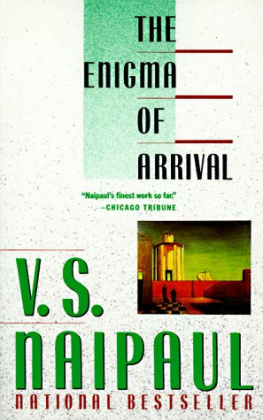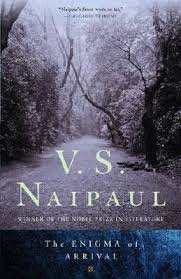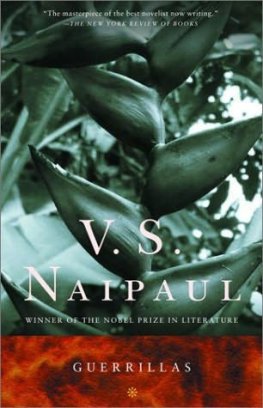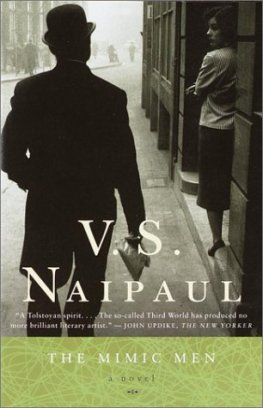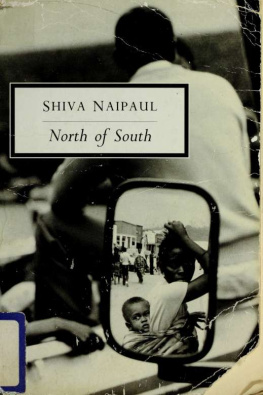V.S. Naipaul - The Mimic Men
Here you can read online V.S. Naipaul - The Mimic Men full text of the book (entire story) in english for free. Download pdf and epub, get meaning, cover and reviews about this ebook. year: 2010, publisher: Vintage, genre: Detective and thriller. Description of the work, (preface) as well as reviews are available. Best literature library LitArk.com created for fans of good reading and offers a wide selection of genres:
Romance novel
Science fiction
Adventure
Detective
Science
History
Home and family
Prose
Art
Politics
Computer
Non-fiction
Religion
Business
Children
Humor
Choose a favorite category and find really read worthwhile books. Enjoy immersion in the world of imagination, feel the emotions of the characters or learn something new for yourself, make an fascinating discovery.

- Book:The Mimic Men
- Author:
- Publisher:Vintage
- Genre:
- Year:2010
- Rating:3 / 5
- Favourites:Add to favourites
- Your mark:
- 60
- 1
- 2
- 3
- 4
- 5
The Mimic Men: summary, description and annotation
We offer to read an annotation, description, summary or preface (depends on what the author of the book "The Mimic Men" wrote himself). If you haven't found the necessary information about the book — write in the comments, we will try to find it.
The Mimic Men — read online for free the complete book (whole text) full work
Below is the text of the book, divided by pages. System saving the place of the last page read, allows you to conveniently read the book "The Mimic Men" online for free, without having to search again every time where you left off. Put a bookmark, and you can go to the page where you finished reading at any time.
Font size:
Interval:
Bookmark:
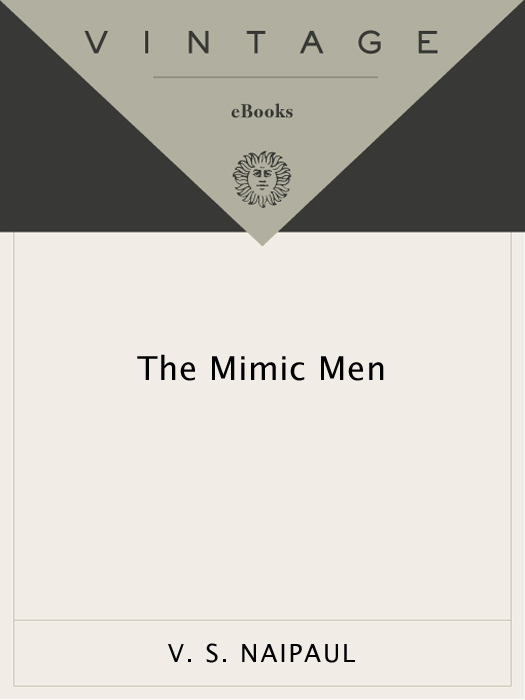
THE MIMIC MEN
V. S. Naipaul was born in Trinidad in 1932. He went to England on a scholarship in 1950. After four years at Oxford he began to write, and since then he has followed no other profession. He is the author of more than twenty books of fiction and nonfiction and the recipient of numerous honors, including the Booker Prize in 1971 and a knighthood for services to literature in 1990. He lives in Wiltshire, England.

NONFICTION
Between Father and Son: Family Letters
Beyond Belief: Islamic Excursions Among the Converted Peoples
India: A Million Mutinies Now
A Turn in the South
Finding the Center
Among the Believers
The Return of Eva Pern (with The Killings in Trinidad)
India: A Wounded Civilization
The Overcrowded Barracoon
The Loss of El Dorado
An Area of Darkness
The Middle Passage
FICTION
A Way in the World
The Enigma of Arrival
A Bend in the River
Guerrillas
In a Free State
A Flag on the Island
Mr Stone and the Knights Companion
A House for Mr. Biswas
Miguel Street
The Suffrage of Elvira
The Mystic Masseur
Published in an omnibus edition entitled Three Novels


FIRST VINTAGE INTERNATIONAL EDITION, AUGUST 2001
Copyright 1967, copyright renewed 1995 by V. S. Naipaul
All rights reserved under International and Pan-American Copyright Conventions. Published in the United States by Vintage Books, a division of Random House, Inc., New York. Originally published in 1967, in the United States by Macmillan, New York, and in Great Britain by Andr Deutsch, London.
Vintage is a registered trademark and Vintage International and colophon are trademarks of Random House, Inc.
Library of Congress Cataloging-in-Publication Data
Naipaul, V. S. (Vidiadhar Surajprasad), 1932
The mimic men / VS. Naipaul.
p. cm.
eISBN: 978-0-307-77656-3
1. Caribbean AreaFiction. 2. London (England)Fiction.
3. PostcolonialismFiction. 4. PoliticiansFiction.
5. ExilesFiction. I. Title.
PR9272.9.N32 M55 2001
823.914 dc21 00-052753
www.vintagebooks.com
v3.1
W HEN I first came to London, shortly after the end of the war, I found myself after a few days in a boarding-house, called a private hotel, in the Kensington High Street area. The boarding-house was owned by Mr Shylock. He didnt live there, but the attic was reserved for him; and Lieni, the Maltese housekeeper, told me he occasionally spent a night there with a young girl. These English girls! Lieni said. She herself lived in the basement with her illegitimate child. An early postwar adventure. Between attic and basement, pleasure and its penalty, we boarders lived, narrowly.
I paid Mr Shylock three guineas a week for a tall, multi-mirrored, book-shaped room with a coffin-like wardrobe. And for Mr Shylock, the recipient each week of fifteen times three guineas, the possessor of a mistress and of suits made of cloth so fine I felt I could eat it, I had nothing but admiration. I was not used to the social modes of London or to the physiognomy and complexions of the North, and I thought Mr Shylock looked distinguished, like a lawyer or businessman or politician. He had the habit of stroking the lobe of his ear and inclining his head to listen. I thought the gesture was attractive; I copied it. I knew of recent events in Europe; they tormented me; and although I was trying to live on seven pounds a week I offered Mr Shylock my fullest, silent compassion.
In the winter Mr Shylock died. I knew nothing until I heard of his cremation from Lieni, who was herself affronted, and a little fearful for the future, that she had not been told by Mrs Shylock of the event of the death. It was disquieting to me too, this secrecy and swiftness of a London death. And it also occurred to me that up to that time in London I had not been aware of death, had never seen those funeral processions which, rain or shine, had enlivened all our afternoons on the Caribbean island of Isabella. Mr Shylock was dead, then. But in spite of Lienis fears the routine of his boarding-house did not change. Mrs Shylock didnt appear. Lieni continued to live in the basement. A fortnight later she invited me to the christening of her child.
We had to be at the church at three, and after lunch I went up to my narrow room to wait. It was very cold. It went dark in the room, and I noticed that the light outside was strange. It was dead, but seemed to have an inner lividness. Then it began to drizzle. An unusual drizzle: I could see individual drops, I could hear them strike the window.
Hectic feminine footsteps thumped up the stairs. My door was pushed open; and Lieni, half her face washed and white and bare, a bit of cosmetic-smeared cottonwool in her hand, said breathlessly, I thought you would like to know. Its snowing.
Snow!
Screwing up her eyes, compressing her lips, she dabbed at her cheeks with the cottonwool big hand, big fingers, small piece of cottonwool and ran out again.
Snow. At last; my element. And these were flakes, the airiest crushed ice. More than crushed: shivered. But the greater enchantment was the light. I went out to the dark passage and stood before the window. Then I climbed up and up towards the skylight, stopping at each floor to look out at the street. The carpet stopped, the stairs ended in a narrow gallery. Above me was the skylight, below me the stair-well darkening as it deepened. The attic door was ajar. I went in, and found myself in an empty room harsh with a dead-fluorescent light that seemed artificial. The room felt cold, exposed and abandoned. The boards were bare and gritty. A mattress on dusty sheets of newspapers; a worn blue flannelette spread; a rickety writing-table. No more.
Standing before the window crooked sashes, peeling paint-work: so fragile the structure up here which lower down appeared so solid I felt the dead light on my face. The flakes didnt only float; they also spun. They touched the glass and turned to a film of melting ice. Below the livid grey sky roofs were white and shining black in patches. The bombsite was wholly white; every shrub, every discarded bottle, box and tin was defined. I had seen. Yet what was I to do with so complete a beauty? And looking out from that room to the thin lines of brown smoke rising from ugly chimneypots, the plastered wall of the house next to the bombsite tremendously braced and buttressed, looking out from that empty room with the mattress on the floor, I felt all the magic of the city go away and had an intimation of the forlornness of the city and of the people who lived in it.
A mattress, a writing-table. Had there been more while Mr Shylock lived? Such a distinguished man, so carefully dressed; and this his room, the scene of his pleasure. I opened the drawer of the writing-table. An identity card, fuzzy at the edges. Mr Shylocks: his neat signature. A creased photograph of a plumpish girl in a woollen skirt and a jumper. The photographers hand had shaken, so that the photograph, like the photograph in some magazine article on great events, seemed rare, as of a person who would be photographed no more. An innocent, unarresting face, untouched by the wonder which vice and the word mistress ought to have given it. She stood in a back garden. The house behind her was like its neighbours. Her familiar home: I sought to enter it in imagination, to re-create the moment an early summer Sunday afternoon perhaps, just before lunch when the photograph was taken. Not by Mr Shylock surely? Brother, father, sister? Here anyway it had ended, that moment, that impulse of affection, in an abandoned room among the chimneypots of what to the girl from the back garden must have seemed like a foreign country.
Font size:
Interval:
Bookmark:
Similar books «The Mimic Men»
Look at similar books to The Mimic Men. We have selected literature similar in name and meaning in the hope of providing readers with more options to find new, interesting, not yet read works.
Discussion, reviews of the book The Mimic Men and just readers' own opinions. Leave your comments, write what you think about the work, its meaning or the main characters. Specify what exactly you liked and what you didn't like, and why you think so.


